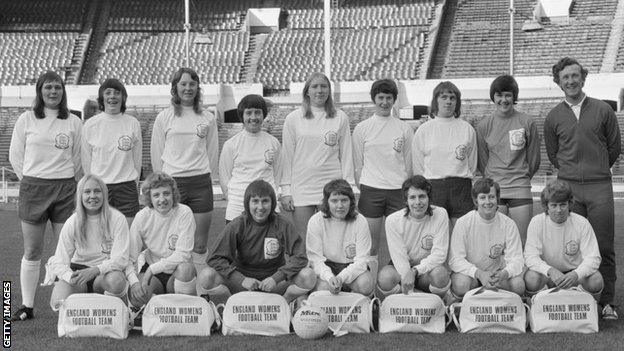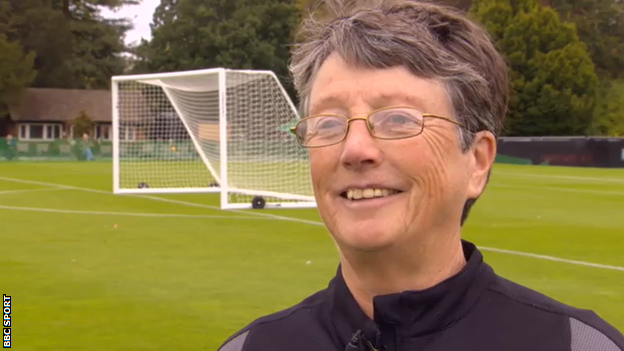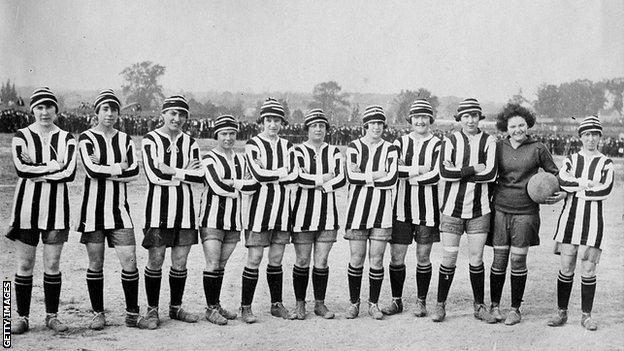First England team to receive caps against United States at Wembley
- Published

England and Scotland met in their first women's international in November 1972 - almost exactly 100 years after the two nations met in the first men’s international
A sold-out Wembley with a match against world champions the United States on Friday is set to be a memorable occasion for the current Lionesses squad - but for some former England players it will be a moment when they finally feel they have got the recognition they deserve.
England's first official women's team did not receive caps from the Football Association for playing in their inaugural international match on 18 November 1972 - a 3-2 win over Scotland.
On Friday evening, members of that squad will line up on the pitch to be presented with caps to mark that match from almost 50 years ago.
Among them will be former defender Maggie Pearce, who tells BBC Sport it will be a "special occasion" for her - although she says it's been a long time coming after years of feeling "ignored" by English football's governing body.
"It's taken 50 years for the FA to come out with it. Whether or not it has anything [to do] with the current squad winning the Euros that they've suddenly realised 'well yes we now need to recognise all those past players that have played'."
She said the move comes after years of campaigning by former players. And for her, that feeling of recognition will come when the cap "is in my hand".

Maggie Pearce joined the current England team at their St George's Park base in Burton this week
Pearce was a 15-year-old schoolgirl playing for Southampton's women's team when she was called up by England for their match against Scotland in Greenock, near Glasgow, in 1972.
She recalls the match taking place on a frozen pitch - "there was no way in today's game they would even have played on that pitch" - as the team came from behind to win 3-2.
"We were quite nervous," she said. "There wasn't much of a crowd there being a freezing cold day... there was a couple of hundred people.
"[My parents] were immensely proud and very supportive, as was the rest of the family."
Her England experience is a world away from that of the current Lionesses squad and Pearce says that although she savoured their success on the pitch at the Euros this summer, she has previously struggled to enjoy watching England play.
"I must admit that in the past, there have been cases that I've been watching and thought 'I can't watch this, I can't watch them'.
"The squad and a lot of the past players have been battling with the FA to have some sort of recognition. Even though [the FA] said they recognised past players, but we always felt that we weren't.
"Even the current squad - they've got their battles still. But through the summer, I was proud to know that I was part of that, a stepping stone for them to be where they are now."
Allow X content?
This article contains content provided by X. We ask for your permission before anything is loaded, as they may be using cookies and other technologies. You may want to read X’s cookie policy, external and privacy policy, external before accepting. To view this content choose ‘accept and continue’.
That European Championship-winning side, who welcomed a group of former players at their training base at St Georges' Park this week, are well aware of how much they owe those past players.
England forward Beth Mead said it was "about time" their achievements were recognised.
"We know as players we wouldn't be here today without the women before us," she said. "We met plenty of the legends earlier in the week. Incredible women. It's nice they have a voice now and are seen for what they have done in the game."
Players' fight for recognition

Dick, Kerr Ladies regularly played in front of crowds of thousands before the FA banned women's football
The FA banned women's football in 1921 - a time when the women's game was attracting crowds of 53,000 - saying "the game of football is quite unsuitable for females and ought not to be encouraged".
It was nearly 50 years later when the FA rescinded that ban, in 1971, following the formation of the Women's Football Association (WFA) a couple of years earlier.
In 1972, England women played their first full international against Scotland.
Sue Whyatt, a reserve goalkeeper for the 1972 team, got in touch with BBC Radio 4's Woman's Hour during this summer's Euros to say that the English players from that team had never been officially recognised.
"Although our contribution has recently started to be recognised, those of us who played under the WFA, because the FA would not recognise us, have still not been awarded official caps," Whyatt said.
"The Scottish team who played in that first match have been awarded caps by the Scottish FA.
"The FA have never apologised to all us women and all the people who kept us playing football. All that time we were banned from the official pitches, they did their upmost to squash the game and we kept going."
In the absence of official caps, members of the team decided to make their own caps to mark their achievements - one Whyatt said she wouldn't part with "for the world".
Patricia Gregory, who was the honourable secretary of the WFA and co-organised that first international, told BBC Radio 4: "Back in 1972, when we formed the England team, we didn't have the funds to buy the caps and so Flo Bilton, a stalwart of those early days, offered to make them and they are greatly treasured.
"Flo didn't have any help so we only used to give the girls one cap when they played their debut match."

Four lives get fatally intertwined... Watch Steven Moffat's devilish thriller starring David Tennant, Dolly Wells, Lydia West and Stanley Tucci
'Alcohol gave me a good hiding': Tony Adams, former Arsenal and England footballer, opens up about his addiction and recovery
